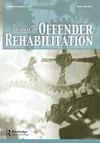Experiences of prison visitation by women: qualitative insights from Kashmir
IF 1.1
Q3 SOCIAL WORK
引用次数: 0
Abstract
Abstract Among many of the activities concerned with the “collateral consequences of incarceration,” visitation has been quite a challenge. In particular, women visitors face several challenges while visiting a carceral space. Using semi-structured interviews with women having a family member incarcerated, we explore the experiences of women visitors visiting a prison in Kashmir. The paper employs a qualitative methodology to understand the experiences of these women visitors. The paper tries to understand the ways in which the prison regime dictates and directs their lives. The paper emphasizes the fact that the effects of incarceration are tremendously bore by these women who jeopardize their own economic and social capital in order to maintain ties with an incarcerated individual. These women are claimed to be the “other victims of crime” and are treated as quasi-inmates inside the carceral spaces. These women live lives marked with stigma and suspicion as they are often assumed to have known about the crime. Thus, they suffer from courtesy stigma and the taint of being equally involved in the crime. The findings reveal that these women face difficulties in visiting their incarcerated kin, endure emotionally intense experiences, and the traumatic experience of prison visitation, ironically, acts as a blessing in disguise. They become increasingly absorbed into the correctional facility, suffer the anxiety of waiting and frustration to meet institutional dictates, and elation or despair that stays with them after spending time with their loved ones in prison.妇女探访监狱的经历:来自克什米尔的定性见解
在许多与“监禁附带后果”有关的活动中,探视一直是一个相当大的挑战。特别是,女性游客在参观室内空间时面临着一些挑战。通过对家庭成员被监禁的妇女进行半结构化访谈,我们探索了访问克什米尔监狱的女性访客的经历。本文采用定性方法来了解这些女性访客的经历。本文试图了解监狱政权是如何支配和指导他们的生活的。文章强调了这样一个事实,即监禁的影响对这些妇女来说是巨大的,她们为了与被监禁的人保持联系而牺牲自己的经济和社会资本。据称,这些妇女是“犯罪的其他受害者”,在拘留所被当作准囚犯对待。这些妇女生活在耻辱和怀疑中,因为她们通常被认为知道犯罪。因此,他们遭受了礼貌的耻辱和同样参与犯罪的污点。调查结果显示,这些女性在探视被监禁的亲属时面临困难,她们要忍受强烈的情感体验,而具有讽刺意味的是,监狱探视的创伤经历反而是因祸得福。他们越来越被监狱所吸引,忍受着等待的焦虑和满足制度要求的沮丧,以及在监狱里与亲人共度时光后的兴奋或绝望。
本文章由计算机程序翻译,如有差异,请以英文原文为准。
求助全文
约1分钟内获得全文
求助全文
来源期刊

Journal of Offender Rehabilitation
SOCIAL WORK-
CiteScore
1.60
自引率
0.00%
发文量
24
期刊介绍:
The Journal of Offender Rehabilitation is a multidisciplinary journal of innovation in research, services and programs in criminal justice and corrections. The journal is an essential professional resource for practitioners, educators and researchers who work with individuals involved in the criminal justice system and study the dynamics of rehabilitation and individual and system change. Original research using qualitative or quantitative methodology, theoretical discussions, evaluations of program outcomes, and state of the science reviews will be considered.
 求助内容:
求助内容: 应助结果提醒方式:
应助结果提醒方式:


